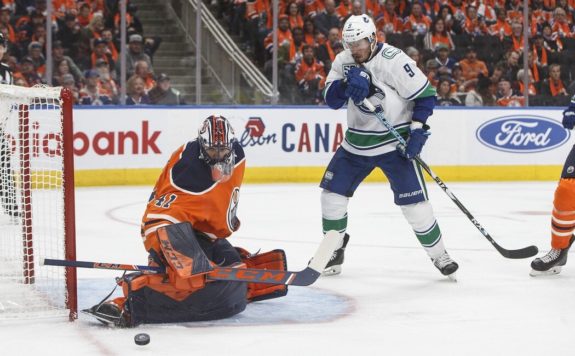It is one of the most fundamental rules of playing hockey: if your team does not want to concede a goal, it must defend properly. A team also has to make its offense count on the power play, using the extra play to its advantage and putting more pressure on the opposition in its own zone. Power plays and penalty kills were some of the Vancouver Canucks’ biggest problems last season, and they have still not fully addressed it as the 2020-21 season reaches its halfway point.
The Canucks have had a mixed overall reaction to giving and receiving penalties as the season has played out. It has especially struggled to overcome penalty kills thanks to defensemen giving away penalties. Tyler Myers, Antoine Roussel and Alex Edler are some of the worst offenders, given that they have stacked up a combined total of 104 penalty minutes. Roussel, who was fined $5,000 last month for punching Oilers forward Jesse Puljujärvi, has been singled out by head coach Travis Green for giving away careless penalties and taking unnecessary risks.
The game against the Montréal Canadiens on March 10 suggested that Vancouver’s penalty-killing units need serious work. The Canucks lost the game 5-1, conceded a power play goal in the second period and totaled 15 penalty minutes. The bottom lines have been deployed for penalty kills, but this has caused a lack of offense in the bottom six and means that the team may need to readjust its lower lines.
Canucks Rely on Miller for Killing Penalties
Vancouver’s penalty-killing suffered at the start of the season, with the team giving up nine power play goals in the first six games and having a 2-4-0 record. The absence of veteran Jay Beagle partly contributed to this problem, and J.T. Miller was deployed on the top penalty-killing line as extra cover. Travis Green spoke highly of Miller’s ability to work well on the penalty kill, saying that the forward “is hard enough to [kill penalties] and brave enough.” (From “J.T. Miller helping suddenly solid Canucks penalty kill” – Daily Hive – 02/16/2021).

Miller’s role in penalty killing was important in helping the Canucks to improve their form, but using him in such a role was not good for the team as a whole. The Canucks needed him on offense for the most part and could not use him on both the power play and the penalty kill, and he risked losing ice time in other areas. This was one of the reasons why he would come off the ice after a successful kill and allow Elias Pettersson to come on when the team was at even strength, thus trying to find some balance within the team.
An injury to Pettersson has forced Miller to temporarily play as their top-line centre, and Vancouver has reshuffled its penalty killers. Players from the top and bottom six have combined in different situations where killing a penalty is required, often with mixed results. The Canucks have neglected their bottom-six offense due to its role in dealing with opposing power plays, which has caused this part of the team to lack offensive display on the lower lines.
Canucks’ Bottom Six Needs A Penalty-Killing Element
Vancouver’s bottom-six has struggled to get points this season, specifically Jake Virtanen and Adam Gaudette. They have been largely unproductive on full-strength lines and in penalty kills, but this is partly because they have been used solely for penalty situations rather than offensive quality. Some have suggested that the Canucks promote players from the Utica Comets to fill in as penalty killers, especially because they will be cheap options.
Jonah Gadjovich is one player who could fill the role. He’s known for being a physical player who showed his strong penalty-killing instinct for the Owen Sound Attack and at the 2018 World Junior Championship. His physical presence could help to alleviate some defensive duties of the bottom six, especially when the team needs to defend. Another player who could step in is Will Lockwood, who signed an entry-level contract with the Canucks last year. Lockwood has used the penalty kill to develop his own style of play, and he has received praise for his vision and ability to monitor the puck.
Vancouver has had many inconsistencies with the power play and the penalty kill. Having started the season with inefficient kills, the Canucks managed to improve on the power play and to concede less penalty minutes. However, some careless fouls and letting power play goals go in hindered the Canucks’ recent performances against the Montréal Canadiens. This means that the team must learn to kill penalties more frequently and efficiently if it is to win games.